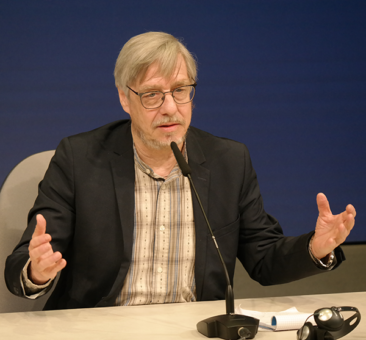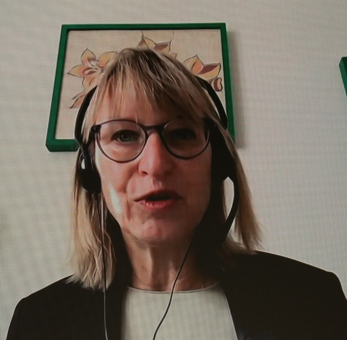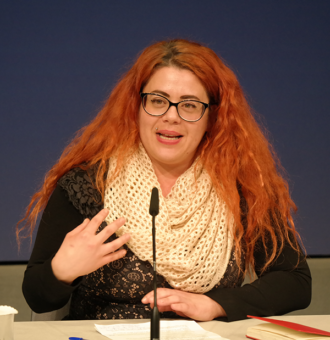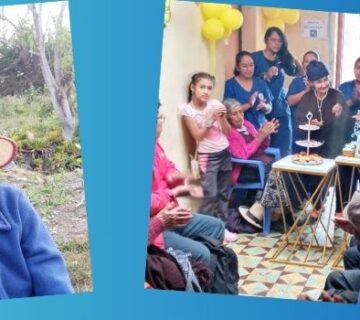For almost ten years, a project of dialogue between Socialists/Marxists and Christians has been underway in Europe under the name of DIALOP. We met some of those involved during their recent visit to the International Centre of Focolare in Rocca di Papa (Italy)
Walter Baier is one of the members of DIALOP, a project of dialogue between Socialists/Marxists and Christians, which involves intellectuals, academics, politicians, activists and students from  different European countries. They say: “We believe that dialogue is the best way to bring about real change and we work to transform the world into a better place to live”. Walter further explained, “I think that with the election of Pope Francis the situation has changed completely, substantially. Not only for the Catholic Church, but also for all the philosophical and cultural currents which oppose neoliberalism. I say this because what the Pope teaches is a way of uniting, which is contrary to individual consumerism. This brings the Pope and the parts of the Church that follow him into a position close to the position of the left, which seeks to emphasize common collective values.”
different European countries. They say: “We believe that dialogue is the best way to bring about real change and we work to transform the world into a better place to live”. Walter further explained, “I think that with the election of Pope Francis the situation has changed completely, substantially. Not only for the Catholic Church, but also for all the philosophical and cultural currents which oppose neoliberalism. I say this because what the Pope teaches is a way of uniting, which is contrary to individual consumerism. This brings the Pope and the parts of the Church that follow him into a position close to the position of the left, which seeks to emphasize common collective values.”
DIALOP’s experience began on 18th September, 2014, during the private audience that Pope Francis granted to two leftist politicians: Alexis Tsipras of Greece and Walter Baier of Austria, along with Franz Kronreif of the Focolare Movement. On that occasion the conversation focused on the environmental crisis and the global social crisis. At the end of the audience Pope Francis invited them to initiate a transversal dialogue, which would involve a wide gamut of society and especially young people.
Baier said, “I have been representing the European Left Party for three months. I am one of the founders. The European Left Party is now composed of 35 parties from 27 European countries. These countries belong to the European Union and I think that our understanding of Europe must really be much broader than just looking at the privileged part of Europe. We need to take pan-Europeanism seriously and we need to understand it better. Europe is not only different, but is also torn apart by deep social and economic divisions. And one of the fundamental demands of the left should be to achieving a decent standard of living in all parts of Europe for our familes. Something we have also learned through being together in dialogue with our Christian friends is how to have differentiated consent and qualified dissent, which is really a very, very useful method. ”
 Cornelia Hildebrandt belongs to Trasform! Europe . In the face of the ongoing wars she has no doubt: “We of the Left share Pope Francis’ statement that every war is a failure of politics. In these times ridden with conflicts, we believe that dialogue is not only an urgent necessity, but a categorical imperative. It takes all our strength to impose a sustainable peace against the destruction of the environment; better living conditions of people against barbarism.”
Cornelia Hildebrandt belongs to Trasform! Europe . In the face of the ongoing wars she has no doubt: “We of the Left share Pope Francis’ statement that every war is a failure of politics. In these times ridden with conflicts, we believe that dialogue is not only an urgent necessity, but a categorical imperative. It takes all our strength to impose a sustainable peace against the destruction of the environment; better living conditions of people against barbarism.”
Dialogue means welcoming the other into your home. It is to become a guest of the guest. It is not only a tool, but a constant encounter, a path of shared intellectual and spiritual experience, in which the distinctiveness of the respective partners does not disappear, but unfolds and develops more clearly. With these encounters, opposites become complementary. Hilodebrandt explains the concept of differentiated consensus and qualified dissent: “We adopt and adapt a method that is used in ecumenism among the Christian Churches. The incoherently formulated basic statements of human society and the world must form a solid basis. In order for partners to speak and act together, common core statements must explicitly make reference to original texts so as to be compatible with the respective traditions of the Catholic Church and of Transform!Europe and beyond. And then it’s about asking questions accurately. And then the search for clear common declarations can begin, which reflect each tradition and enrich each other”.
 Angelina Giannopoulou is a young Greek woman from Tranform! Europe. She recounted her experience in Dialop and underlined the importance of the presence of young people for the present and future of this reality. She also told us about the “DialogUE Project” which, in collaboration with the European Community involves 14 civil society organizations. It will give an important input to the World Youth Day in Lisbon (Portugal) with a day dedicated to communication that will involve politicians, experts and young people. In the future there will be other symposia on ecology and social policies.
Angelina Giannopoulou is a young Greek woman from Tranform! Europe. She recounted her experience in Dialop and underlined the importance of the presence of young people for the present and future of this reality. She also told us about the “DialogUE Project” which, in collaboration with the European Community involves 14 civil society organizations. It will give an important input to the World Youth Day in Lisbon (Portugal) with a day dedicated to communication that will involve politicians, experts and young people. In the future there will be other symposia on ecology and social policies.
Walter Baier concluded, “We cannot accept the situation in which we find ourselves today in Europe and in the world, I think this is the strongest vocation of Dialop”.
Carlos Mana
For more information and access to the “DIALOP Position Paper” see the Dialop website (https://dialop.eu/).


 Italiano
Italiano Español
Español Français
Français Português
Português




È bene che persone interessate al futuro nostro = dell’Europa – possano avere degli spazi di dialogo e ….
per i comuni mortali, soprattutto anche di formazione.
Muy interesante los conceptos de ‘ consenso diferenciado’ y ‘disenso calificado ‘. No los conocía. El diálogo desde esta premisa nos da sorpresas en el tiempo de una paz sustentable y transformación de los corazones, que pude confirmar hace una semanas. con jóvenes de familiares desaparecidos y presos políticos en nuestra provincia de Córdoba, en el Archivo Histórico de la memoria. Me acerqué a ellos para encontrar familiares de un joven, con quien en plena represión del estado argentino, en una estación de tren por un gesto de solidaridad que nos encontró, dialogamos desde nuestro consenso diferenciado y nuestro disenso calificado, la experiencia de compromiso de cada uno y cada cual en nuestra realidad social. El, antes de morir, me expresó que la guerrilla era una farsa y que creer en el Amor de Dios personal y comunitario – en la que yo creía – era la verdad. Sólo conocí su nombre de guerra y después de varios años, cuando pude viajar a Córdoba, quise encontrar a sus familiares para comunicarles la paz de su corazón antes de morir. En la búsqueda me encontré con jóvenes, ex-detenidos, ciudadanos comunes e hijos de represores – desconocidos entre nosotros – que atravesando el dolor de tanta crueldad, se habían encontrado con el perdón, la solidaridad humana y el corazón que nos une ya que somos familia humana. Es cierto que sólo estuve con un pequeño grupo de ciudadanos y también es cierto que con la misma frecuencia de fraternidad humana que nos unió con Héctor hace ya 47 años.
Es cierto que nuestras historias continentales son distintas, cómo también los problemas económicos, politicos y sociales, aunque también es cierto que todos somos humanos. Por experiencia puedo decir ‘ es la única realidad que nos une en todos los continentes ‘ Cuidar al otro como a uno mismo, nos permitirá encontrar la humanidad que perdimos